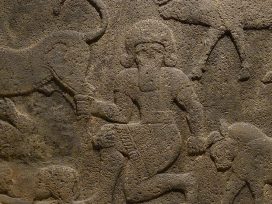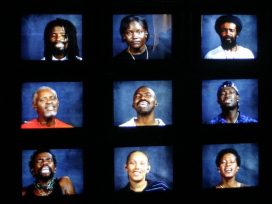Back in the 1960s, Jean Améry’s “Torture” (1965) was required reading. The line “Whoever has succumbed to torture can no longer feel at home in the world” had an exceptional persuasive intensity. In his iconic text, composed twenty-two years after being subjected to the torment of torture, Améry reflects on the pain inflicted on his body and soul. He develops a sort of anthropology of agony, scrutinizing the modes and manners of a deliberate and maliciously executed violence, one that rips through the layers of the flesh, wilfully rends the body’s limbs, engendering abysmal suffering. The procedure starts with a first and definitive blow, shattering the human being’s elementary trust in the world. Reflecting on its foundationally destructive impact in devastating man’s personality, Améry writes: “The first blow brings home to the prisoner that he is helpless, and thus it already contains in the bud everything that is to come.”
Améry’s essay presents a philosophy of pain remembered, of pain brutally inflicted on his body. In July 1943, after being arrested as an anti-Nazi resister, he was removed to Fort Breendonck, located between Antwerp and Brussels. There he was subjected to torture – a site of memory emblemized by W.G. Sebald in his novella Austerlitz, in allusion to Améry’s existential experience there.
“There I experienced it: torture,” writes Améry. Yet the pain was not inflicted upon him randomly. The purpose of the torment directed at his body was to break his will as a political opponent to the regime, to compel him to betray his associates, his comrades. The torture carried out on the prisoner Améry was inflicted on a person who had chosen to resist – something that happens all the time and everywhere. Améry writes: “Somewhere, someone is crying out under torture. Perhaps in this hour, this second.” For him, the pain was exemplary, but by far not exceptional. All the more resolute and ultimate, therefore, was his judgment: “Torture is the most horrible event a human being can retain within himself”.

Re-read decades later, however, the text strikes us as odd. First and foremost because Améry goes beyond philosophical reflection on and anthropological comprehension of the phenomenon of torture, culminating as it does in the fundamental loss of human trust in the world, to expose torture as the very core of Nazism. According to Améry, torture proves itself not just to be “an accidental quality of this Third Reich, but its essence”. Moreover, he categorically affirms that: “It was precisely in torture that the Third Reich materialized in all the density of its being”. And finally: torture was certainly “no invention of German National Socialism. But it was its apotheosis.” This sweeping statement is surprising. It is perplexing in its basic reference as well as in the light of further writings by Améry, who after all was a prisoner in Auschwitz and Bergen-Belsen, though not of Birkenau. The latter would have excluded any chance of later testimony.
After careful further readings of Améry’s iconic text on torture, the creeping impression asserts itself that his reflections on the pain inflicted on his body and soul demand, to a certain extent, that another, different experience – the experience of mere destruction, of annihilation, which, as we know, was the real essence of Nazism – be overwritten. The fate of the Jew Améry, powerfully argued in his other writings, is, in the text on torture, altered by the fate of Améry as political resistor. Both experiences seem to oppose each other in moral range and philosophical meaning. In his much hailed piece on torture, Améry seems to have chosen between the individually experienced pain inflicted on his body as a political resistor and the phenomenon of collective death, of biological extermination. Nevertheless, the latter’s presence persists in the text as trace element, as residue, lurking between the lines, obviously displaced. For instance, when Améry alludes to Himmler’s “Posen speech” of October 1943, when the Higher SS and Police Leader addressed a gathering of subordinates entrusted with the task of annihilation, praising their maintenance of “decency” in the face of the tens of thousands of corpses that had piled up as the fruit of their labour. Améry bends and reinterprets Himmler’s notorious endorsements of destruction by attributing the mentality of the SS leader and that of his kind to the sadism of the torturer. To this end, Améry invokes the philosophy of de Sade as interpreted by Georges Bataille. The sadist, as Améry puts it, “had to torture, to destroy, in order to be great in bearing the suffering of others. He had to be capable of handling torture instruments, so that Himmler would assure him his Maturity Certificate in History. Later generations would admire him for having obliterated his feelings of mercy.”
The word “torture” placed in this quote of Améry is emphasized in italics, while the following word, “destroy”, feels like an insignificant term, subjoined without any genuine rhetoric power, an afterthought empty of all relevant meaning. Actually, Améry encounters Himmler earlier in the text, or more precisely: Himmler’s portrait on the wall of the so-called Geschäftszimmer at Breendonck prison. It may be that Améry took notice of the picture only during his visit there years after, now a museum. Anyway, in Améry’s mind the image of Himmler, the genocidal mass murderer, seems to have merged with his likeness on the wall in that room, opening the gate to the Hades of torture Améry experienced in that Belgian fort.
In Améry’s tale, Nazi destruction, annihilation and extermination becomes entirely subjugated to the narration of torture. This strategy of displacement is also notable in the light of Améry’s rejection of Hannah Arendt’s notion (though he consistently avoids mentioning her name) of the “banality of evil”, advanced just two years previously in her report “Eichmann in Jerusalem”. Améry, apparently ignoring the meaning and the application of the term against the backdrop of industrial mass-destruction, affirms over and again the validity of his experience: “But this does not mean that the evil they inflicted on me was banal. If one insists on it, they were bureaucrats of torture. And yet, they were also much more. […] With heart and soul they went about their business, and the name of it was power, dominion over spirit and flesh, orgy of unchecked self-expansion.”
There are various reasons why Améry might have emphasized of the ordeal of torture over the overwhelming evidence of the Nazis’ mass-murder and annihilation. One of them could have been the fact that, in the early 1960s, this particular aspect Améry’s experience – his personal encounter with torture – stood much closer to the dominant public discourse of the time, especially in the context of French political culture that he so readily adopted, than did annihilation. Born Hans Mayer, Améry finally ratified his cultural conversion by officially transforming his name into romance form in 1955; a transformation, by the way, that another Austrian of similarly ambiguous Jewish origin had simultaneously endeavoured, by means of French existentialism and personal acquaintance with Sartre – namely André Gorz. Gorz, of whom Améry was evidently aware, writes illuminatingly about cultural conversion, in 1957 publishing his psychoanalytically encrypted autobiography with the conspicuous title Le Traitre – the traitor.
The year that Améry changed his name was the first year of the Algerian war, a war in which the French military made systematic use of torture. In his biographical-philosophical sketch on torture, Améry refers repeatedly to Algeria and the torture being practiced there – especially to Henri Alleg’s book La Question, published despite the French censor in 1958, which Améry called a “frighteningly exact and sober book […] whose circulation was prohibited, the report of an eyewitness who was also personally tortured and gave evidence of the horror”.
La Question was the pre-Revolutionary, technical term for torture executed by the agencies of state power. Though definitely the most influential, Alleg’s was not the only book on torture at that time. Améry also mentions La torture: Son histoire, son abolition, sa réapparition au XXe siècle by the lawyer Alec Mellor. Looking back at the era of war and anti-Nazi resistance, Mellor’s work was first published in 1949; when it was re-published in 1961, it targeted a new present. As Améry notes, “half the French nation rose up against the torture in Algeria”.
Améry wrote his essay on torture in the echo of the war in Algeria and the protests against torture in France. In the discourse of the time, the iconized experience of the Resistance figured as an inviolable sanctuary of French heroism – and above all the steadfastness under the hands of German torturers like Klaus Barbie. In Améry’s essay, Jean Moulin, whose remnants were later enshrined in the Pantheon, is recalled as exemplary of stalwart heroism. All the more remarkable was that in Algeria, former résistants, now representatives of the Republic, were torturing in the Republic’s name. That was the tenor of Sartre’s comments in his preface to La Question. There is a sense that Alleg’s description of his ordeal – the torture he suffered at the hands of soldiers of the Tenth Para Division under the command of General Jacques Massu in El-Biar, a suburb of Algiers – flows into Améry’s essay, which is no less existential and biographical in its thrust. It is as if the recent events of the Algerian tragedy evoked in Améry the story of his own torture endured at the hands of the Nazis, and this at the cost of relegating Auschwitz. Indeed, the horrors of torture were the pressing tale of the time – the negative telos of all previous history. Or, as Sartre put it, speaking in the spirit of the day: Hitler had been only a precursor.
Alleg’s existential experience, as contrasted with that of Améry the inmate of Auschwitz, who had suffered the torment of torture as well as the prospect of collective death, had only been torture. For Alleg, all existential experience culminated in the torture inflicted on him in order to break his will and force him to betray his comrades. In his report he wrote about torture as torture, and only as torture. And the intent was political in its immediacy: to denounce the military and its secret practice of torture, and to call French public attention to the dirty war in Algeria. However, it is likely that the experience of this French communist and former editor of the newspaper Alger républicain was infected by the prevailing memory of German occupation and French resistance.
Henri Alleg was born in London as Henry Salem in 1921, the son of Polish Jewish immigrants, who soon resettled in Paris. In 1939, Henry, aged 18, went to Algeria to get involved in communist activities. After the French defeat, Algeria and the French colonial empire remained under Vichy government – a concession granted to the regime by Hitler in the mortifying armistice agreement of Compiègne. In the wake of the successful disembarkation of Allied forces in North Africa in 1942 (“Operation Torch”), Algeria gradually came under the control of the Free French. In contrast with Améry, who first experienced torture as a political resister in Belgium, and who was later deported as a Jew to Auschwitz, Alleg spent those deadly years under what was, by comparison, a moderate regime.
For Alleg, especially after the war’s end, the outrage was the continuous discrimination and colonial subjugation of Muslim Algerians. Nonetheless, under the torture carried out by the French soldiers on his body in 1957, residues of memory surfaced from the time of the German occupation in France. Fragmentary memories of that past might have even heightened Alleg’s resistance to the pain inflicted on him by those revenants of Nazism. Not the actual former-SS personnel who had served in the Indochina War in the ranks of the Foreign Legion, where orders were given were in French and the dying done in German; rather, simple Frenchmen who resorted to a practice that placed Alleg in a line with the résistents tortured by the Nazis fifteen years before.
French history is marked by a unique constellation. An East-West historical orientation focuses on events in Europe, on the continent. A North-South perspective foregrounds events in the colonies. In actual fact, the two axes – the horizontal and the vertical – merge with the another. This has significant consequences both on the plane of reality and in the realm of memory. With the étrange défait in the spring of 1940, France withdrew from the Second World War, which only erupted in all its intensity from 1941 onwards. To a certain extent, France did not participate in the war, re-entering an era of increasing warfare precisely and paradoxically at the very moment when the war was expiring – namely between 1944 and 1962, the era of extended French colonial warfare.
This had a lasting impact on French political awareness and political culture. If the memory of the deportees and thus of Auschwitz was noted at all, and had not been submerged by the dominant myth of Resistance heroism, then the crimes of colonialism and its dirty wars, especially the crime of torture, shifted to the centre of contestation and disgust. Thus it was that, against the backdrop of the French experience of anti-Nazi resistance and anti-colonial struggle, the encounter with torture became a perennial negative icon of horror and atrocity.
Améry’s text on torture is symptomatic of the discourse of that time. Although confronted in Auschwitz with collective – i.e. Jewish – death, it seems that in the 1960s he felt obliged to submit his experience of genocide to the discursive hegemony of torture. Such displacement was obviously tempting for Améry, since he had himself been subject to torture. The “testimony of the body”, as he designated the torment of torture, also offered a collateral gain: his torture promised recognition as a political opponent of the Nazis. The phenomenon of mere annihilation – of sheer extermination, of biological extinction – had, in contrast, no political meaning whatsoever. And while torture is intended to extract from the prisoner knowledge in order to aid the fight against the collective that he belongs or has chosen to belong to, extermination has no coherent meaning. In that respect, the death factories were, by definition, senseless.
Améry is not to be blamed for his choice. Two experiences and two analogous narrations stood biographically at his disposal: the political struggle, emblematically signified by the suffering of torture; and the collective extermination he witnessed in close-up, while surviving. In his essay “Torture”, one experience interferes with the other – displacing, and to some extent appropriating, the ultimate event.







